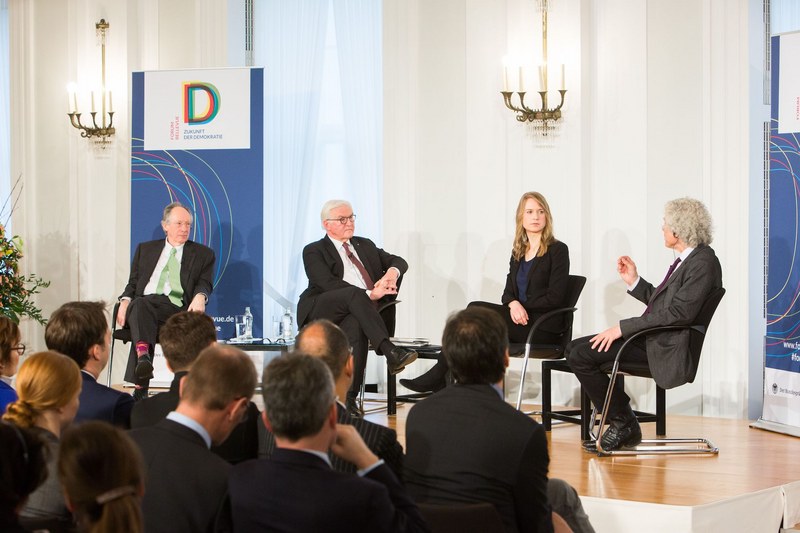"Which Future? On Democracy and Progress"
25 November 2019
What does progress mean in our society and what are the societal preconditions that are needed if we are to find innovative and sound solutions to urgent and complex challenges such as the digital revolution, globalisation and climate change. Federal President Frank-Walter Steinmeier discussed this with his guests at the eighth "Forum Bellevue on the Future of Democracy".
When it comes to the future, we look ahead. However, the President stated in his address that the necessary "self-confidence, courage and optimism" were notable for their absence in Germany at the present time. "Indeed, many people look forward with great concern. Climate change, the digital revolution, globalisation, and tensions and conflicts on numerous continents all contribute to a sense of anxiety", said President Steinmeier. He discussed the reasons for this and how citizens' confidence in progress to the benefit of the greatest number of people can be restored and strengthened with his panel members and the audience at the eighth "Forum Bellevue on the Future of Democracy".
The Federal President's guests were the German media psychologist Maren Urner (HMKW University of Applied Sciences for Media, Communication and Management in Cologne), the British author Ian McEwan and the American-Canadian cognitive scientist and linguist Steven Pinker (Harvard University).
Perceptions instead of facts: What do people find fascinating about "bad news"?
The entire discussion was guided by the question as to why we humans perceive negative impressions more strongly than positive ones.
The media psychologist Maren Urner said that we were bombarded with too much negative news on a daily basis. She went on to say that focusing on the negative was part and parcel of human nature. We paid greater attention to one-off, negative events which do not make up the bulk of world events than to positive news. She said that this was due to the largely negative nature of the news, as well as to our human "Stone Age brain", which focused more on dangers in order to ensure the survival of the human race. People were thus more receptive to negative news. In terms of evolutionary biology, this was a sensible protective mechanism. In other situations, however, having our perceptions channelled in this way could lead to a feeling of being overwhelmed and, consequently, to passivity. Maren Urner concluded by saying that when people increasingly turned away from world events out of fear or self-protection, this also damaged democracy in the long run.
This, she added, eroded trust in democracy and its institutions on a long-term basis. Everyone agreed that we could not allow people to turn their backs on democracy as a result of this. The Federal President drew attention to the findings of a recently published study: "Fewer and fewer people consider our political system to be a special strength of our country. Fewer than half of the respondents believed our state was functional." But it was quite the opposite: "Only democracy", the Federal President said, "provides a mechanism for self-correction", and was therefore the "system of government of the brave". For people who felt powerless could not make their voices heard, could not join in the action, could not change anything, the Federal President said.
This was also stressed by Steven Pinker, who put forward several arguments – passionate and full of facts – in support of democracy in his comments. He said that all the statistics showed that in contrast to autocracies, people in democracies were much healthier and enjoyed greater freedom and prosperity. Nor could he subscribe to the narrative that democracies were slowly dying. He said that we focus too often on negative examples in Russia or Turkey, where democratic institutions are being dismantled. The Harvard Professor went on to say that we were losing sight of the many positive examples such as Nigeria, Tunisia, Ethiopia or Armenia, where democracy had made considerable progress during the last few years, even if these processes were not always linear.
A cloud of doom despite of prosperity: the paradox of democracy
The fact that there was nevertheless growing distrust in democracies and political institutions and their representatives was paradoxical when one looked at the facts. However, it could possibly be explained by human nature. It prevented us from making purely rational decisions. Moreover, democracy itself had inherent problems, for example the time limits on holding office and ultimately the voters themselves. Ian McEwan stated that the writings of Max Weber in the early 20th century contained many indications that people were less likely to elect intellectuals to political office than individuals to whom they felt close and to whom they could relate. That did not always lead to the election of the best person for the job. Ian McEwan went on to say that the phenomenon of low information voters, who sometimes voted contrary to their own economic or social interests due to a lack of information, made the scepticism vis-à-vis democracies even stronger. Steven Pinker interjected that in general there were not any one hundred percent perfect systems which were fair and efficient for everyone in equal measure and granted every individual the same level of freedom. He added that possible alternatives such as autocracies were always the worse choice for everyone in every respect.
Steinmeier on the state of democracy: "There is much that we need to do, but there is also much that we can do"
As well as taking stock, the panel members also outlined constructive solutions for the future of democracy. Ian McEwan stressed that democracy offered opportunities to involve people more immediately in political decision-making processes with a view to ultimately fostering greater acceptance and recognition of political compromises and decisions. He took Ireland as an example where a strict ban on abortion was averted in 2018, partly by getting ordinary citizens involved. McEwan said that this was one of the most prominent examples of the success of the deliberative democracy models.
Steven Pinker pointed out again that the general trend – also in empirical terms – was towards liberalisation and democratisation. He added that wherever trust was eroding, people had to be reminded of the negative alternatives.
Maren Urner outlined a further solution – that of constructive journalism. She said that editors should not only review the daily disasters but also provide concrete solutions to show how things can be done better. The Professor commented that people were certainly prepared to pay for a form of journalism which not only reported events but also appraised and commented on them.
We could thus be positive about the future again. "There is much that we need to do, but there is also much that we can do", that – according to President Steinmeier – should be our attitude in and towards democracy. The Federal President summed up his hopes for the future of democracy by saying, "We should not focus on the idea that things can get worse, but should marshal our forces so that we can make things better."
The speech of the Federal President for the event can be downloaded here. (pdf).

